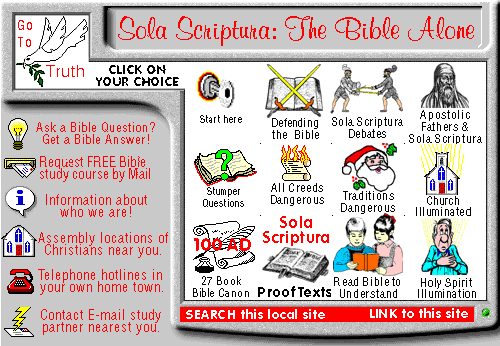The Apostolic Fathers referred to false doctrine as tradition that should not be followed.
"So then, brethren, stand firm and hold to the traditions which you were taught, whether by word of mouth or by letter from us." (2 Thessalonians 2:15)
Introduction:
The Apostolic Fathers referred to false doctrine as a tradition that should not be followed. When the Apostolic Fathers stated that the tradition of the Gnostics, for example, differed from the church' tradition, they were not referring to oral tradition, but the set of doctrines that were taught in scripture.
Tradition #5: False doctrine
. (Mk 7:7-9; Col 2:8; 2 Tim 4:2-5; Titus 1:14)
Any tradition that contradicted scripture was considered false doctrine. The fathers refer to the heretical "traditions" of the Gnostics, for example, that contradict the inspired, written and oral revelation of the apostles and prophets. The "church fathers" would point out that the Gnostic theology differed from scripture and the Gnostic tradition differed from the church's apostolic tradition. The reference to the tradition of Corbin in Mk 7:11 is particularly applicable to the Roman Catholic and Orthodox churches since they have a
large number of human traditions that actually change the revealed law of God in scripture!
A. Scripture references to false doctrine as tradition:
'But in vain do they worship Me, Teaching as doctrines the precepts of men.' "Neglecting the commandment of God, you hold to the tradition of men." He was also saying to them, "You are experts at setting aside the commandment of God in order to keep your tradition. "For Moses said, 'Honor your father and your mother'; and, 'He who speaks evil of father or mother, is to be put to death'; but you say, 'If a man says to his father or his mother, whatever I have that would help you is Corban (that is to say, given to God),' you no longer permit him to do anything for his father or his mother; thus invalidating the word of God by your tradition which you have handed down; and you do many things such as that." Mark 7:7-13
"See to it that no one takes you captive through philosophy and empty deception, according to the tradition of men, according to the elementary principles of the world, rather than according to Christ." Colossians 2:8
"preach the word; be ready in season and out of season; reprove, rebuke, exhort, with great patience and instruction. For the time will come when they will not endure sound doctrine; but wanting to have their ears tickled, they will accumulate for themselves teachers in accordance to their own desires, and will turn away their ears from the truth and will turn aside to myths. But you, be sober in all things, endure hardship, do the work of an evangelist, fulfill your ministry." 2 Timothy 4:2-5
"not paying attention to Jewish myths and commandments of men who turn away from the truth." Titus 1:14
B. References to false doctrine as tradition by the Fathers:
Irenaeus clearly point out that their false teachers tradition differed from the church's tradition. (Against Heresies, Book 3, Ch 3, 2)
Cyprian calls the Gnostic doctrine a "sacrilegious tradition against God long after the apostles, and after long lapse of time from them." (Cyprian, Epistle 74, 5).
Cyprian referred to false doctrines of Pope Stephen as "traditions". Cyprian proves here that he viewed traditions of the church to be acceptable only when they agreed with the Bible and for those "traditions" that contradict scripture Cyprian says, "custom without truth is the antiquity of error". Wow! We couldn't have said it better ourselves. (Cyprian, Epistle 73:2,3,8,9, of Pope Stephen's false teaching on baptism) Cyprian also condemns Stephen, the bishop of Rome, for his false teaching on baptism and asks pope Stephen where he got his tradition, then threatens he should be withdrawn from for heresy! Here is an example of where the "Fathers" applied the phrase, "Traditions of men", quoting Mk 7:7-9, to the "church traditions" of the church of Rome.
Here we have dietary rules for monks called, "the ancient tradition of the fathers". This is a perfect example of how post apostolic man-made rules directly contradict the teaching of the New testament that says the Christian can eat anything he likes, common food or the food of kings, as long as it is accepted with prayer and thanksgiving. 1 Tim 4:1-4 actually calls John Cassian's diet rules, "doctrines of demons ... who advocate abstaining from foods". "For the nature of gluttony is threefold: first, there is that which forces us to anticipate the proper hour for a meal, next that which delights in stuffing the stomach, and gorging all kinds of food; thirdly, that which takes pleasure in more refined and delicate feasting. And so against it a monk should observe a threefold watch: first, he should wait till the proper time for breaking the fast; secondly, he should not give way to gorging; thirdly, he should be contented with any of the commoner sorts of food. For anything that is taken over and above what is customary and the common use of all, is branded by the ancient tradition of the fathers as defiled with the sin of vanity and glorying and ostentation." (John Cassian, Book V, Of the Spirit of Gluttony, Ch 23)
By Steve Rudd

Go To Start: WWW.BIBLE.CA
